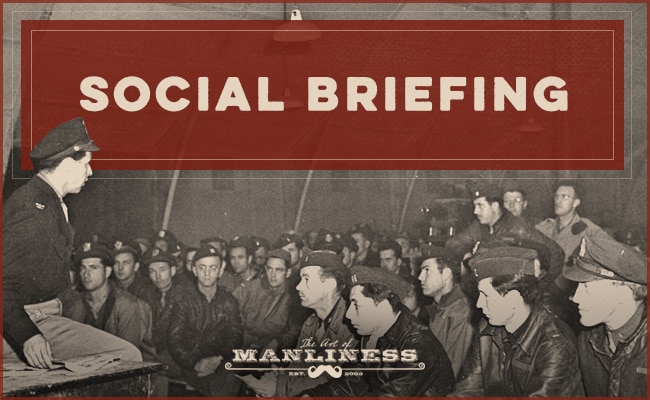
Social Briefings are short bi-monthly dispatches that offer practical tips to improve your social skills. Read more on their raison d’etre.
Social Briefings will largely concentrate on practical tips for improving your interactions with other people. But in these first installments we’re going to go a little higher level, beginning with two questions/thought-starters that will contribute to forming a more accurate view of how you currently socialize, and how you might do so in a better way.
We’ll talk about the first question this time, and the second the next. Here’s the first:
Are your old patterns of social behavior still working for you?
A lot of how we learn to interact with others develops in our youth, and partly because of conditional circumstances present during that part of our lives.
Maybe you ended up as a new kid at a new school, and to get your classmates to notice and like you, you developed a very extroverted sense of humor and became the class clown.
Or perhaps you went through a phase of trying on a “Goth” or super-serious-philosophical personality where you eschewed all seeming “superficialities,” spoke little, and refused to engage in light small talk in favor of always asking “edgy” and provocative questions.
Or maybe you were really popular, and never had to take the initiative in trying to make friends because people always befriended you, and you learned to be content in waiting for others to make the first move.
These behaviors might have worked alright for your purposes as a teenager, but it’s good to re-reexamine whether or not they’re still working for you as an adult.
It’s possible your constant stream of sarcastic jokes and quips that once left your high school pals in stitches, now come off as hurtful, immature, or overly “try hard.” Or perhaps your manic class clown energy reads as too hyper and actually prevents people from connecting with you on a deeper level and getting to know your sincere side.
Your penchant for skipping small talk to jump right into serious discussions might now read to others as pretentious and off-puttingly awkward.
Your popularity in high school might not have translated into popularity as a new guy at a new company in a new city, and you might wait forever for others to introduce themselves to you and invite you to hang out.
Even if your old social habits aren’t working for you in your new life, it can be hard to realize that fact for a few reasons.
For one, these ingrained behaviors are comfortable and familiar, like a worn-in pair of shoes. You’re deeply attached to them. Even though you may have put them on at a certain part of your life, you now experience these habits as part of the “real” you.
Second, they probably still “work” with your old friends and family. But, of course, they’re able to put your quirks in context; they may not even notice your off-putting behaviors, or they know enough about your positive qualities not to mind. Your social patterns may not work as well when you’re making first impressions with new acquaintances, potential romantic partners, and possible customers, since their initial snapshot of you will be all they have to go on in figuring out what you’re like.
Finally, you likely perceive your behaviors as coming off differently than they actually do. Most of us have a fairly high opinion of ourselves, or at least read our habits in the most flattering light. And we think others read them in the same way.
But this may not be the case.
If you’ve ever been dropped in a situation outside your comfort zone – a situation in which you didn’t know anyone – and thought you’d do well because you’re so beloved by your old friends, but instead struggled to socialize and connect with people way more than you thought you would, you’ll have glimpsed this gap between how you perceive yourself and how others perceive you firsthand.
In our next Social Briefing, we’ll take a closer look at the nature of these kinds of gaps.

